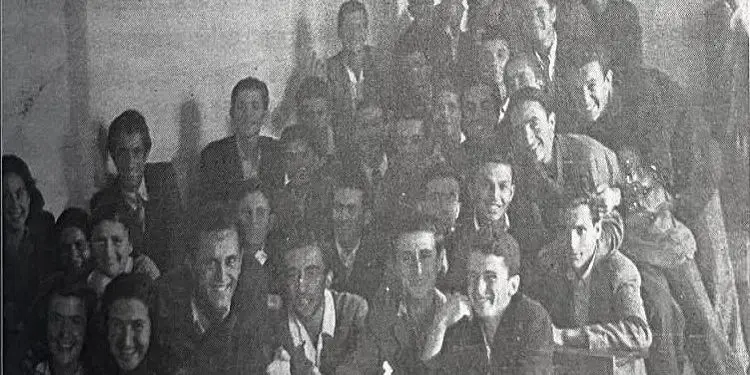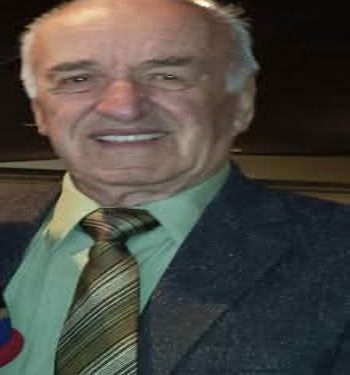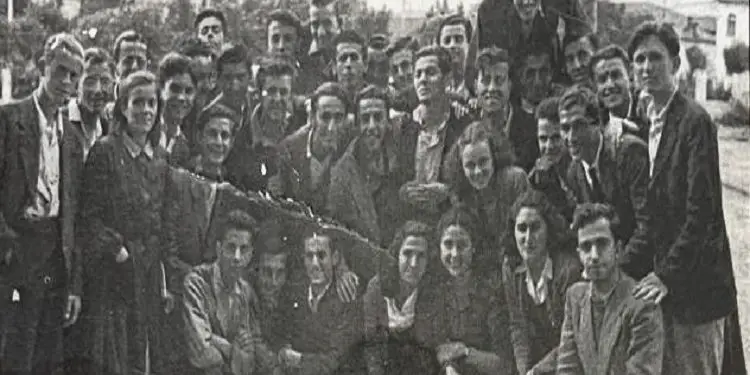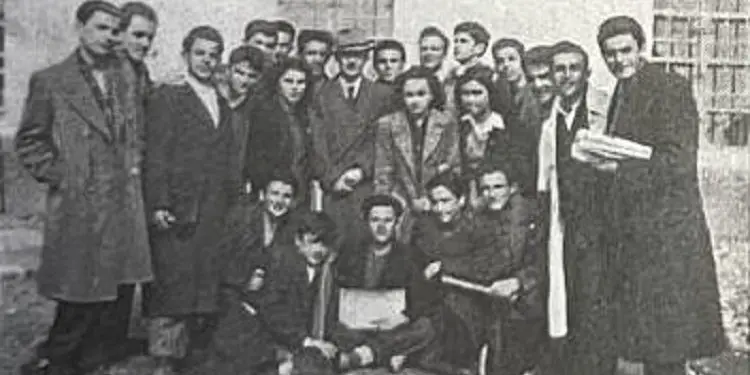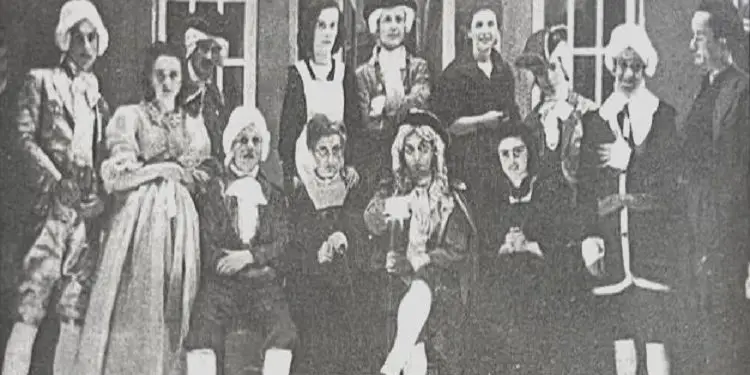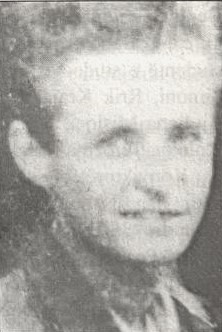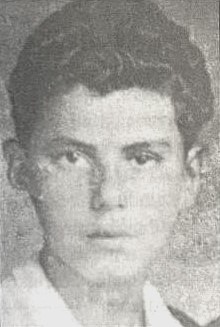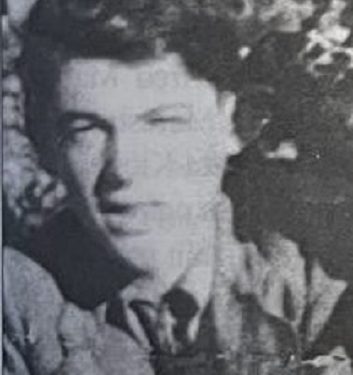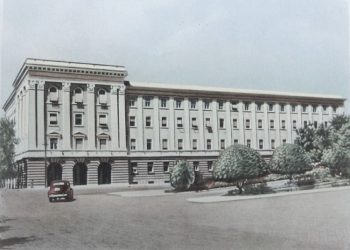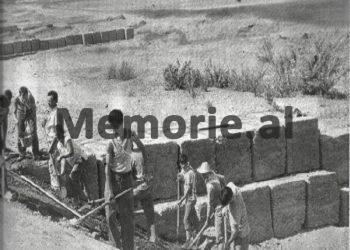By Ahmet Bushati
Part twenty-four
Memorie.al/After the flag was altered in 1944 with the addition of the communist star, Shkodra transformed into a center of resistance against the regime, paying a high price for its tradition of freedom. By April 1945, high school students, already feeling betrayed by the promises of the war, gathered to oppose the new terror that imprisoned and killed innocent people. Communism turned Kosovo into a province of Yugoslavia, while Shkodra was punished for its “historical crime”- its defiance against invaders. The “Postriba Movement” became a tool to suppress all dissent, plunging the city into an unprecedented spiral of suffering: imprisonments, executions, and the destruction of families. The high school students, alongside citizens, became symbols of resistance, while some “young communists” turned into tools of the State Security, leading to expulsions, imprisonments, and internments.
Four times, Shkodra rose in armed rebellion, but history forgot these battles. This book is written to remember the countless prisoners, the tortured, the killed, and the parents who suffered in silence. It is a warning against dictatorship and a plea for future generations not to forget the sacrifices made for freedom.
Continued from the previous issue
In the Footsteps of a Diary
Shkodra in the first years under communism
The Anti-Communist Movement of the Shkodra High School
Although tearing up a wall newspaper seemed inappropriate for our age, we nevertheless decided to tear up that wall newspaper during the day. To be extra careful, I set off on my bicycle to do the deed, avoiding another friend of ours who was not being careful enough. Upon arriving at the place, I leaned my bicycle against the wall and, noticing nothing suspicious around, I approached the wall newspaper to tear it up quickly, but surprisingly, I quickly stopped in my tracks, unable to act: the photograph of Qemal Stafa in the center of it made me immediately abandon the purpose for which I had gone there.
Taking with me the reprimanding look of Qemal Stafa’s two soft pupils, which at that moment seemed to be telling me “No, you should never do that”, I returned satisfied that at least I had avoided a certain mistake on the part of another friend and also that I had avoided an unnecessary torment for my conscience. It was May 5, the day of the martyrs.
On one of those days Burhan Hoti would tell me that in his class, they had formed the first nucleus with Gjylter Pipa, Sadush Ulqinaku and Cuf Mehmeti. He also told me that Faik Luli was also optimistic about the establishment of such a nucleus in his class and as far as I remember the names of the brothers Thabit and Bahri Rusi, the strong Hamdi Omari, a certain Ferdinad Leka and a couple of others, were the first targets of his project.
The creation of a nucleus in the 7th grade and the hope that Faik Luli would create one in his 6th grade was an encouragement that, for conspiratorial reasons, only I among my friends enjoyed. The connection with friends from one or two higher grades was a serious premise for the position that our activity in the high school should take a plus in terms of its organization and prestige. As mentioned above, our connections continued and would continue to remain a secret from others, so much so that when I, after a year and a half, went to prison, neither Xhevat, on the one hand, nor Burhani, or Faik, on the other, would know anything concrete about the association or about any other connection that I would make in the future.
The conspiracy in this direction was of such a scale, with which we believed that the fate of our movement was connected, but of course, without having been such in all cases, as much enthusiasm and exposure that we had shown several times in our opposing position.
For example, Faik Luli, trusting in the good name he enjoyed among others, as well as enthusiastic about what he had undertaken, would speak about Western democracy and Kosovo, within a circle of friends not very controlled by him, and I did not know then and do not know today, who that case and that person had been that had brought him to the brink of prison, but I know that from certain imprisonment, he was saved by the quick intervention of a person with a position in the party and government, as well as me who did not bring him to the investigator. As per the order of the person in question, Faiku had to remain imprisoned inside his house for two consecutive years, without anyone seeing or hearing him.
The high school’s physical education event, which would symbolize the end of a school year in “freedom” conditions, was decided to be celebrated with the greatest possible grandeur, and to coincide with the third anniversary of the founding of the National Liberation Army. For this reason, since a month ago, the high school, every afternoon and after classes, together with their supervising professors, would regularly train on the old sports field, and on the way back, our two 5th graders, together with the 4th graders, would walk the long way from the hospital to the high school, singing patriotic songs. Together with us, the girls, our friends.
Especially when we entered the square, at the end of the evening and in coincidence with the traditional walk of our citizens, our songs would be sung even more. We felt very proud of the courage we showed, being aware that those banned songs were not only serving as a concretization of our hatred for the regime, but that we also believed that they would act on the people, as a call for change.
On one of those days, I would meet by chance Haki Llazanin, a war veteran, who at that time was serving at the Internal Affairs Branch, Mirdita. We had maintained good relations since the War, a time when I had served him several times, and on the occasion of this day, he would ask me as if in surprise, stretching his arms to the side: “Hey, Metush – (Metush had always called me kindly) – yesterday I came from Mirdite and last night I was very impressed by the students who sang against the government, just as we used to against fascism. What do they mean by that? A friend also told me that for several days now the students have been walking around the square like this. Okay, okay, let them do as they please, but you, Metush, don’t mix with them”!
As we passed us singing, citizens on both sides of the street would stop and follow us with sympathetic glances and shy smiles. All around us, near or far, we would see spies. We had the impression that every day more and more people were seeing us when we returned from the sports field. We had the opportunity to receive congratulations from citizens for what we were singing night after night. My friends and I had occasions when familiar men had spoken to us more or less like this: “We had abandoned the square, and now we are coming out every day to see you sing”! In connection with the above, in a speech I gave a few years ago, in memory of our martyred professor, Qemal Draçini, I would describe one of our famous returns from the sports field as follows:
…..”When we reached the center of the square, where our song usually sounded even louder, I noticed that on my left, along with us, prof. Draçini was also singing. I was instantly moved. We did not want prof. Draçini to expose us to such danger. We did not claim this sacrifice of his, and we were so comprehensive as to justify any prudence on his part. We were closely monitored by a number of spies who walked parallel to the sidewalks and, in step with us, recorded us face to face and name to name.
Professor Draçini had experience and knew many things, and perhaps he wanted to reserve those for them, but by then he had spoken to his students a lot, and it seemed clear that above all, he sought to remain coherent with what he had instilled in them during that school year: honest and loyal even under the threat of prison, or even death itself, which, in turn, would swallow him up in the most cruel way, less than a year later.
On the day of the demonstration, as the last opportunity that was to be used by us for that school year, we had decided to openly express our opposition to that regime, which was already hated by everyone, before the people present. Two or three days before the demonstration, the lyceum administration had given orders that the students should wear white shirts for that day, because red stars would be placed on them. We informed them of the above, and we decided that on the day of the demonstration, one by one, we would accept those stars, holding them in our hands for a short time, then, at the signal of one of our comrades, we would throw them to the ground in the most demonstrative way and finally we would trample them with our feet.
We had thought of keeping such a plan a secret until shortly before the beginning of the ceremony, in order that it would not come to the ears of the lyceum administration and the communists. Ultimately, our plan would go astray, but without losing sight of its purpose: the distribution of stars began as soon as we arrived in the schoolyard, before we even set off for the sports field, something we had not anticipated. Before such a fact could happen, some of our friends, on their own initiative, quickly dispersed to other classes, telling them to refuse to receive the stars.
Before such a reaction from many students, the youth activists who were trying to distribute stars temporarily stopped their work, hoping to carry out such an action in the sports field, where there would be authorities, security, etc., but that we, however, when we were in the sports field, would repeat the action even more resolutely, not accepting those stars and not taking them and trampling them as we had decided, because many of the students, not knowing our plan to trample them, had refused to take them before us.
However, this act would finally make us feel as happy as we could. That day we returned earlier than usual and, as we had throughout the month, singing our national songs. Yes, could you have imagined that we were singing those songs for the last time, as it would actually happen? Yes, with the songs of that day, that wonderful cycle of our anti-communist manifestation would be closed forever, something that we, of course, could not have imagined.
However, on that last day, very happy as we were, we did not know that; could happen in the future, we did not disperse as usual even in the school yard, but as if to vent our irrepressible revolt for the last time, we entered the school like rebels, some singing and some shouting at the top of our voices and also slamming doors and windows with force, but without damaging them, to come down but in a mess after a few minutes, and like every other time, we dispersed cordially, and unfortunately, without anyone remembering that Remzi Quku had been left alone somewhere inside the high school.
He, having continued to search for us from one class to another and as always with a song in his mouth, had accidentally met Professor Draçin in the corridor, who out of respect for him had stopped the song, while Prof. Draçin had said to him: “Sing, Quku, sing”! When Remzia had started to descend the stairs alone behind him, four or five communists, among whom were the professor without a degree, Filip Pema and the student with a revolver in his hand, Ferit Mandia, had come up to him like robbers and, dragging him by force, had locked him in the large hall below, in the hall where years before we had held drawing classes with Prof. Simon Rrota.
At the time when a random student informed me of the above, none of his friends were inside the schoolyard. After many punches and kicks that I had to knock on the door of that hall, they finally opened it for me, and I, not without shock, would see how four or five people had pushed Remzi in the middle, pulling him from one side to the other, and shouting at him the names of the adults who had pushed him and his friends during that school year into such “reactionary” actions.
After more than forty years, I would meet Filip Pema by chance at the house of a friend of mine in Tirana. I would be surprised not only by his political 180-degree turn, but also by the courage he was showing in openly mocking the regime that had not yet entered the agony of its death in 1990. Until then, there had been cases when the Sigurimi, as well as a group of communist students, had not remained passive. Three or four of them, one day, had found our friend, Njazi Barbullushi, alone in a flowerbed and had fought with him.
Another day, some communist women – but not students – had also fought on the main street with the courageous student, Ana Dajë, trying to forcefully remove a badge with religious symbolism that she was wearing hanging from her black collar. The fourth-grade student, Angjelin Nenshati, would be chased by a group of young communists across the square to take away a “Catholic Action” badge from him. For this reason, Angjelin Nenshati, like Ana Daja, would be expelled from the youth organization, which would mean separating him from the other students, declaring him a political and dangerous opponent.
Around this time, the students Terezina Pali, Fiqret Pipa, Gac Logoreci, Safet Sokoli and her brother, Hodo, who, having fled to Elbasan at that time, to one of his married sisters, would perhaps have escaped a possible prison, but as we know, not forever. These would happen after the events of Postrriba and the alibi; “of finding weapons in the church” and, within a few days, the students Terezina Pali and Ana Daja would also be arrested.
As we have seen, all the movements against the communist government, developed from the beginning in the Shkodra area, would have the Postrriba uprising as their epilogue, in which case the communist vampire would pounce with all his known fury on the best, most learned and most patriotic people that Shkodra had together with the surrounding areas and mountains, at a time when the curve of the anti-communist movement of Shkodra students, had been at its unrepeatable zenith, to fall back somewhat, but not completely and forever.
The anti-communist student movement of Shkodra, like nowhere else in Albania, had been born and taken life only to be extinguished for several more years. Its fighting spirit would continue to inspire other students who would challenge the dictatorship with courage and dignity. If we do not move away from the period we have just ended, I believe that especially the former students of the two 5th and 4th grades, during their lives must have remembered with nostalgia that wonderful school year of 1946, when they had the opportunity and honor to manifest their patriotic spirit and to make that modest contribution towards the denied freedom, to have pride and beautiful memories for their entire lives, while we, their comrades who were imprisoned, would take with us those songs that we had sung together on the streets of Shkodra, to continue singing them in prisons and labor camps with as much desire and fervor as when we had been students of the 5th grades.
The opening of the new 1946-47 school year would coincide with the most serious political climate in Shkodra. On one of those first days of school, on a foggy and drizzly morning, after we had all been gathered in front of the school’s central entrance, the new principal from Korça, Nesti Haviari, was introduced to us, who at that time were replacing the former principal Dhori Samsuri, who was also from Korça.
The new principal’s face, dry, elongated and green, in which not a single muscle of life moved, seemed to us a bad omen for the future of the high school. At the same time, an army of aggressive and hateful boarding students for us arrived at our high school, who had gathered “like a horse’s hooves”, generally from the south, with the shameful mission of further damaging that anti-communist high school in Shkodra. Those who, even by their behavior, would sometimes show a lack of education and citizenship, having taken on the miserable and ugly role of mercenaries, and having been placed under the merciful leadership of a small and irresponsible group of young communists from Shkodra, would be unleashed like wolves on their fellow Shkodra students, called by them “reactionaries”.
And if that gymnasium from decade to decade had served as a temple of learning and fraternal solidarity between local students and those coming from other parts of Albania and, as such, had also been a permanent bastion of the struggle for freedom and social development, since the arrival in Shkodra of those “historical” boarding students, and for several years in a row, that gymnasium would be transformed into a permanent arena of provocation and war.
Even worse than those boarding schools, would be some of the communist and insidious young people of Shkodra, who, for many evils, would be put in the service of the dictatorship and of the same notorious and cruel Sigurimi, when they secretly incited and directed those boarding schools against the best students of Shkodra, with whom they, as sons of the same city, should have been brothers, were the ones who, if they had followed and sued us, would become the direct cause of the expulsion of some students from youth and school, and they, too, would be the cause of the imprisonment of some of them and the forced escape of some others, and consequently, the cause of the persecution and great suffering of their families, with the “cross of guilt” on their backs for the rest of their lives!
But in the meantime, for the sake of truth, I must state that not all those young communist dormitories had aggressors and spies. For example, there was no such dormitory as Enver Babameto, my friend from the bank, and there was no Valdet Kumbaro, who, even though she came from the wars and continued to be organized as a young communist, would never confuse her humane ideas with those of the dictatorship, much less confuse her education with them, with a pronounced emancipatory and peaceful character, which she had received from her well-known family in Shkodra.
She initially approached me through Sime, to continue to remain a good friend of mine forever, and to Sime, she would never be separated from her, no matter how much the situations changed for the worse. Valdet Kumbaro would be Sime’s loyal friend, so much so that even in the most frightening times, she would secretly go to her house in the dark of the night, and as needed, even if she had to go under the garden fence, which ran behind the house. Memorie.al
But in the meantime, for the sake of truth, I must state that not all those young communist dormitories had aggressors and spies. For example, there was no such dormitory as Enver Babameto, my friend from the bank, and there was no Valdet Kumbaro, who, even though she came from the wars and continued to be organized as a young communist, would never confuse her humane ideas with those of the dictatorship, much less confuse her education with them, with a pronounced emancipatory and peaceful character, which she had received from her well-known family in Shkodra.
She initially approached me through Sime, to continue to remain a good friend of mine forever, and to Sime, she would never be separated from her, no matter how much the situations changed for the worse. Valdet Kumbaro would be Sime’s loyal friend, so much so that even in the most frightening times, she would secretly go to her house in the dark of the night, and as needed, even if she had to go under the garden fence, which ran behind the house. Memorie.al




